One year at the UK's most international university - 2017 roundup

In February, Times Higher Education confirmed Imperial's status as the UK's most international university
Imperial reached farther than ever in 2017 as the UK's most international university grew its collaborations and connections around the world.
A series of international research partnerships took off this year, including many new EU-funded projects, as Imperial cemented its place as the continent’s fourth largest recipient of European Commission grants.
In March, the President of Cyprus launched a multi-million euro collaboration between Imperial and the University of Cyprus on cybersecurity and critical infrastructure.
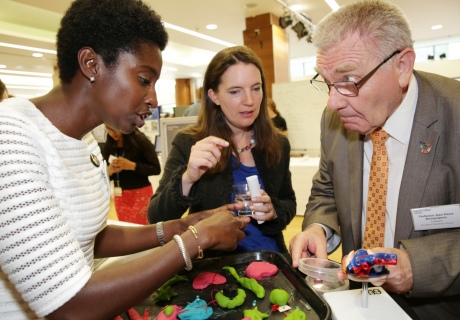
ERC President Bourguignon meets Imperial researchers
Let’s think globally and let’s try to solve global problems
– Boris Ochoa Tocachi
PhD student and President's Scholar
Several rounds of European Research Council grants boosted research projects in all four faculties, ranging from wearable devices to tackle epilepsy and nanoscale sensors to new approaches to understanding obesity and behavioural research into entrepreneurial clusters.
The societal impact of Imperial’s European and global research impressed ERC President Jean-Pierre Bourguignon as he visited the College to celebrate the research body’s 10th anniversary. He said: “We hope that we can help others to follow Imperial in embracing discovery, supporting great people and being open to the world.”
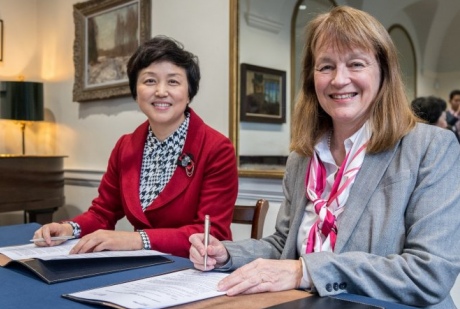
Imperial launched a seed fund with Tsinghua University in December
Beyond Europe, major collaborations took shape with China’s Tsinghua University, Germany’s TUM and Japan’s Tokyo Tech – the latter, where Imperial is working on new bioscience research, builds on ties that can be traced back to the 19th century.
Welcoming innovators, defending internationalism
Throughout the year, Imperial’s leaders advocated policies that will support the College’s global community and connections. As President Alice Gast wrote for the World Economic Forum in January, Innovators thrive "when cultures collide and collaborate". 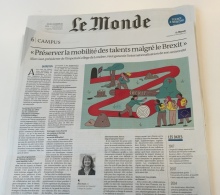 In October, Provost James Stirling told Japan’s Nikkei, the world’s highest circulation financial newspaper, that regardless of any policy changes around Brexit, “Imperial will continue to bring together talented people from all over the world”.
In October, Provost James Stirling told Japan’s Nikkei, the world’s highest circulation financial newspaper, that regardless of any policy changes around Brexit, “Imperial will continue to bring together talented people from all over the world”.
Throughout the year, Professor Gast made the case for visa policies that will support student and researcher mobility and made it clear that Imperial remains open to talent and new collaborations, including via interviews with Le Monde in France, the Globe and Mail in Canada, the New Straits Times in Malaysia, the South China Morning Post in Hong Kong, multiple Indian newspapers, and London’s Evening Standard.
Global challenges
Imperial embraced global challenges in 2017. Researchers from across the College won support from the UK’s Global Challenges Research Fund to work with international partners on projects as diverse as bringing solar power to rural communities in India and developing biopharmaceuticals in Thailand.
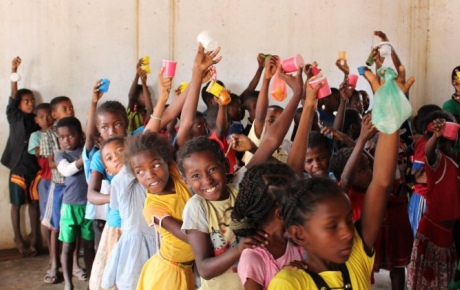
The Schistosomiasis Control Initiative has reached millions of children in sub-Saharan Africa
US philanthropists Dustin Moskovitz and Cari Tuna of Good Ventures donated $13.5 million, enabling Imperial’s Schistosomiasis Control Initiative to treat up to 27 million people whose lives have been blighted by schistosomiasis and parasitic intestinal worms across East, West and Central Africa.
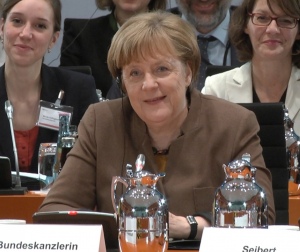
Chanceller Merkel discussed AMR with Professor Alison Holmes in Berlin
The College’s expertise bolstered the international fight against antimicrobial resistance. In February, Professor Alison Holmes, who leads ARC@Imperial, joined Chancellor Angela Merkel in Berlin, to explore ways of reducing misuse of antibiotics.
In July, Dr Céire Costelloe showed the World Economic Forum in Dalian how big data provides a chance to better monitor and respond to infection outbreaks and limit the impact of antimicrobial resistance.
Imperial’s global student community showed similar determination to take on the great challenges of our time. Speaking to an audience of diplomats, academics and students at a celebration for Imperial’s international scholars, Ecuadorian Civil Engineering PhD student Boris Ochoa Tocachi said: “We have to think more outwardly… in a world where over a billion people lack access to fresh water, 1 in 5 people in developing regions still live on less than $1.25 a day, and, every 20 seconds, a child dies as a result of poor sanitation.”
Outstanding alumni
Imperial’s 190,000 strong alumni community played a greater role than ever as the College’s ambassadors, advocates and supporters around the world.
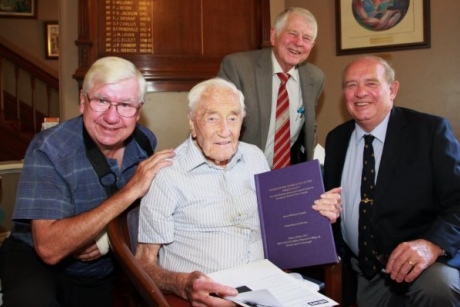
Dr David Goodall in Perth: 75 years after gaining his Imperial PhD
Imperial’s alumni association in Western Australia honoured one of their more distinguished members. Dr David Goodall (BSc 1935, PhD 1941), who turned 103 this year and is Australia’s oldest working scientist, received a newly bound copy of this PhD thesis 75 years after completing it at a special event in Perth.
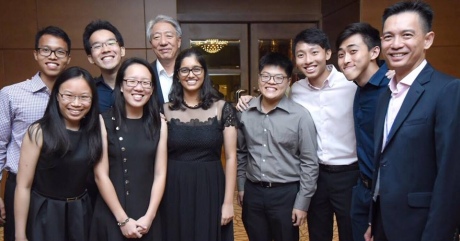
Singapore's Deputy PM Teo celebrated the alumni association's 40th anniversary
Two of Imperial’s most active alumni groups celebrated major anniversaries. In September, Singapore’s Deputy Prime Minister Teo Chee Hean (MSc Computing 1977) addressed more than 300 alumni and friends at a 40th anniversary gala dinner. The event took place just a week after Imperial officially opened LKCMedicine, its joint medical school with NTU in Singapore. In October, the Imperial College Alumni Association of Hong Kong marked ‘35 years of innovation and excellence’ with a symposium and gala dinner.
Other major events took place in Toronto, Paris, Kolkata, Bengaluru, Taiwan and Dubai, where the achievements of the Imperial-educated women at the helm of global businesses in UAE took centre stage.
Influencing and innovating
World leaders including Hong Kong’s chief executive and Australia’s deputy prime minister visited the College in 2017, seeing Imperial's global lead in medical technology and carbon capture research respectively.
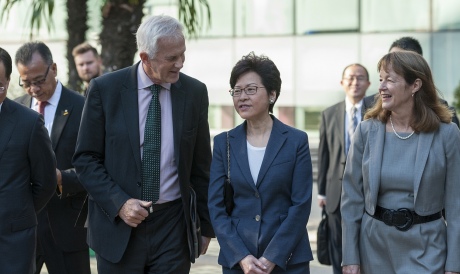
Hong Kong Chief Executive Carrie Lam visited Imperial in September
President Gast debated China’s “new innovation landscape” at a global summit in May. UK, Indian and international leaders descended on Imperial for a major globalisation conference in June.

Billion pound startup Improbable simulates the world's internet backbone
Imperial startups had a stellar year across borders too. Audio detection company Sonalytic, founded by Dr Martin Gould as a postdoctoral researcher in the Department of Mathematics, sold to Swedish streaming giant Spotify in March. Improbable, a virtual reality firm co-founded by Computing alumnus Peter Lipka, was valued at £1 billion after selling a stake to Japan’s SoftBank.
Main image of international scientific collaborations: computed by Olivier H. Beauchesne & Scimago Lab, data by Scopus.
Article text (excluding photos or graphics) © Imperial College London.
Photos and graphics subject to third party copyright used with permission or © Imperial College London.
Reporter
Andrew Scheuber
Communications Division